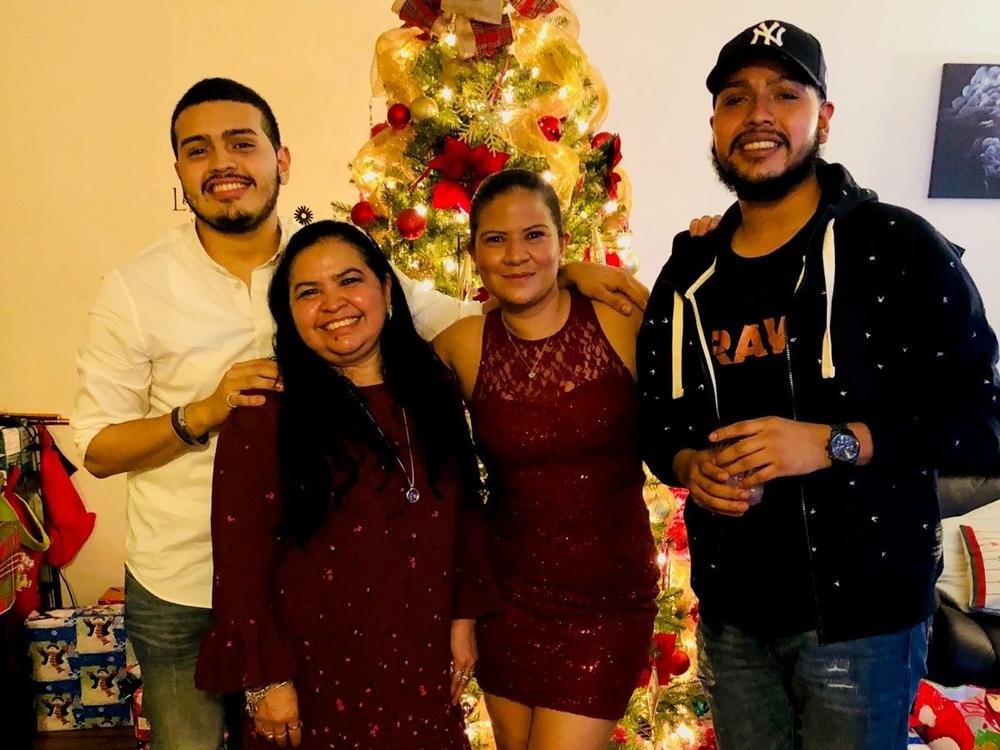Section Branding
Header Content
Judge Blocks Biden Deportation Ban, Jeopardizing Former DACA Recipient
Primary Content
Javier Castillo Maradiaga's fate hangs in the balance, caught between a deportation ban and a temporary restraining order against it.
The 27-year-old former DACA recipient's planned deportation to Honduras early Monday morning had been stopped by President Biden's 100-day moratorium on most removals. He was even transferred from an Immigration and Customs Enforcement staging facility in Alexandria, La., to a facility in New York. But as of Thursday he was back in Louisiana, a point of final departure for many ICE detainees.
According to Maradiaga's sister, Dariela Moncada Maradiaga, 37, who lives in New York City, he told her over the phone he expects to be deported at 5 a.m. Friday.
"I'm upset because I knew this could happen," she says.
His attorney, Rebecca Press, is also filing emergency appeals for his release.
A federal judge issued a temporary restraining order Tuesday, stopping Biden from enforcing the ban for 14 days. Judge Drew B. Tipton, of the Southern District of Texas, says the Biden administration failed "to provide any concrete, reasonable justification for a 100-day pause on deportations."
The order targets a memo by acting secretary of the U.S. Department of Homeland Security, David Pekoske, which ordered ICE to pause most deportations and prioritize removals of people who the agency says are public safety or terrorism risks.
Tipton was appointed by former President Donald Trump. Republican Attorney General Ken Paxton of Texas filed the suit.
"The Court's decision to stop the Biden Administration from casting aside congressionally enacted immigration laws is a much-needed remedy for DHS's unlawful action. A near-complete suspension of deportations would only serve to endanger Texans and undermine federal law," Paxton says.
A White House spokesperson said Tuesday: "We're confident that as the case proceeds, it will be clear that this measure was wholly appropriate in ordering a temporary pause to allow the agency to carefully review its policies, procedures, and enforcement priorities – while allowing for a greater focus on threats to public safety and national security."
There was no comment about Maradiaga's case.
An ICE spokesman, Marcus Johnson, could not confirm Maradiaga's status. He did say as of Jan. 23, about 1.2 million people have final orders of removal and that roughly 6,000 people with those orders are in ICE detention.
Maradiaga's attorney Rebecca Press, filed emergency stays of removal with the Board of Immigration Appeals and ICE, as well as other motions to reopen his proceedings and request his release from ICE custody.
César Cuauhtémoc García Hernández, a law professor at the University of Denver who studies migration and immigration policy, says even under the order, ICE doesn't have to deport people like Maradiaga. The portion of acting secretary Pekoske's memo telling ICE to prioritize removing people it sees as terrorism and public safety risks still applies.
"Targeting him would certainly seem to conflict with the enforcement priorities announced by DHS last week. ... it would seem ICE has the discretion not to deport him, but of course, an exercise in discretion means it can go either way," García Hernández says.
Maradiaga had been set to board a removal flight to Honduras due to fly out at 2 a.m. on Monday. But at 6:12 p.m. on Sunday, Press got a call from ICE saying Maradiaga's deportation flight was canceled. Just minutes later she was on television with Rep. Ritchie Torres, D-N.Y., discussing the case.
Maradiaga had been a recipient of DACA, the Deferred Action for Child Arrivals policy, which allowed him to stay in the United States. But his status expired in July 2019. Maradiaga came to the United States in 2002 when he was 7.
Dariela says her brother had been a student at Wagner College on a scholarship before dropping out because his immigration status prevented him from accessing federal student aid. He worked at a restaurant and delivered food, and lived with her at an apartment in the South Bronx before deciding to move out when he feared being targeted by immigration authorities.
Dariela, his sister, says he didn't apply for renewal out of fear that giving his personal information to any government agency would allow ICE to track him down. Press says similar fears are common.
According to Press, on Dec. 14, 2019, Maradiaga was arrested in the Bronx for jaywalking. Press says other charges were added before the New York Police Department transferred Mardiaga to ICE custody days later. He was in detention for 14 months until ICE issued his final removal order this month.
All charges against Maradiaga have been dismissed and sealed, Press says. But Maradiaga lost his last appeal to stay in the United States in October.
Maradiaga's family held a rally Sunday calling for his immediate release, and Torres wrote ICE urging the agency to cancel Maradiaga's deportation.
With Maradiaga now back in Louisiana, "It really shows you there's a certain amount of luck to this — and that shouldn't be the case," Press says, adding that she believes if the order had arrived just a couple of weeks later, his life would be totally different.
Press, legal director of the immigrant rights group Unlocal, took the case soon after the moratorium was issued.
The rest of Maradiaga's immediate family have DACA. His parents are under Temporary Protected Status. The family moved to the United States to escape gang violence and threats to their safety in Honduras.
The family and Unlocal are holding a second rally in Foley Square, New York City on Thursday night to call for his release.
"As immigrants, we're afraid, we don't want to attract attention, and we tend to deal with these things in silence," Dariela says. "Once we decided to go public, we had an elected official, Ritchie Torres, helping out, sending letters. ... So we're trying to be vocal about what's happening in our communities so there are no more Javiers."
Copyright 2021 NPR. To see more, visit https://www.npr.org.

